Module 1 Unit 1 Let's try to speak English as much as possible 课件 (外研版八年级英语上册)
文档属性
| 名称 | Module 1 Unit 1 Let's try to speak English as much as possible 课件 (外研版八年级英语上册) |
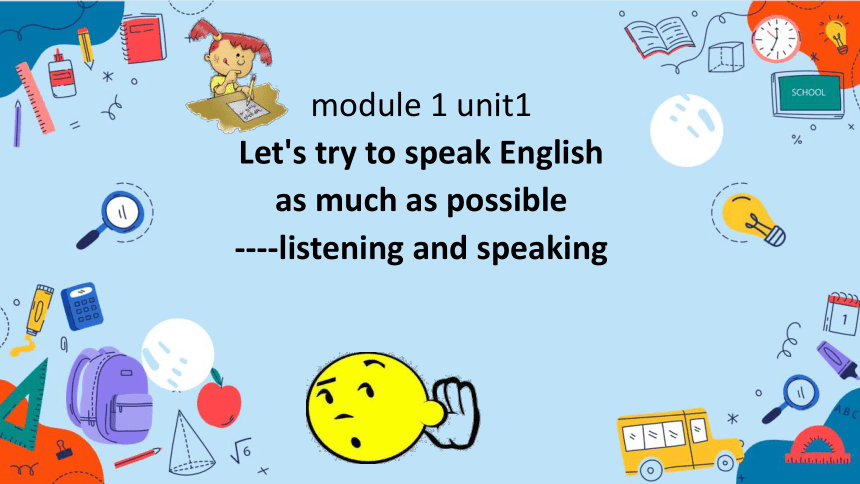
|
|
| 格式 | pptx | ||
| 文件大小 | 11.9MB | ||
| 资源类型 | 试卷 | ||
| 版本资源 | 外研版 | ||
| 科目 | 英语 | ||
| 更新时间 | 2024-07-20 00:00:00 | ||
图片预览


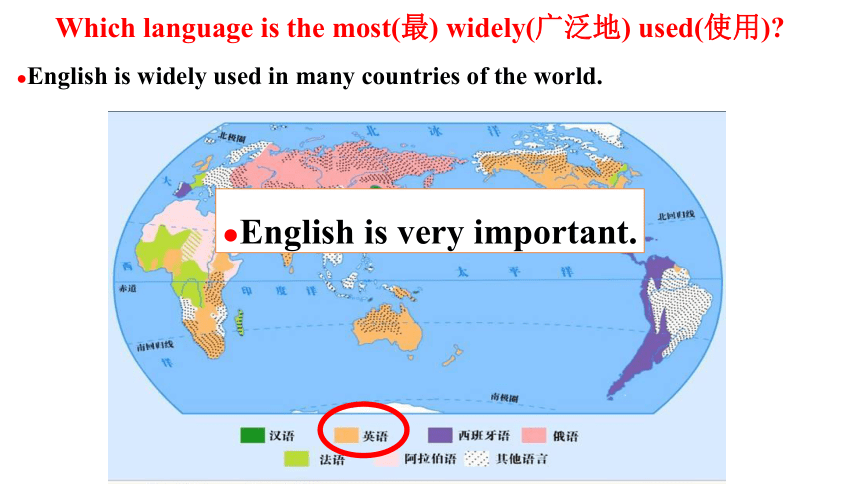

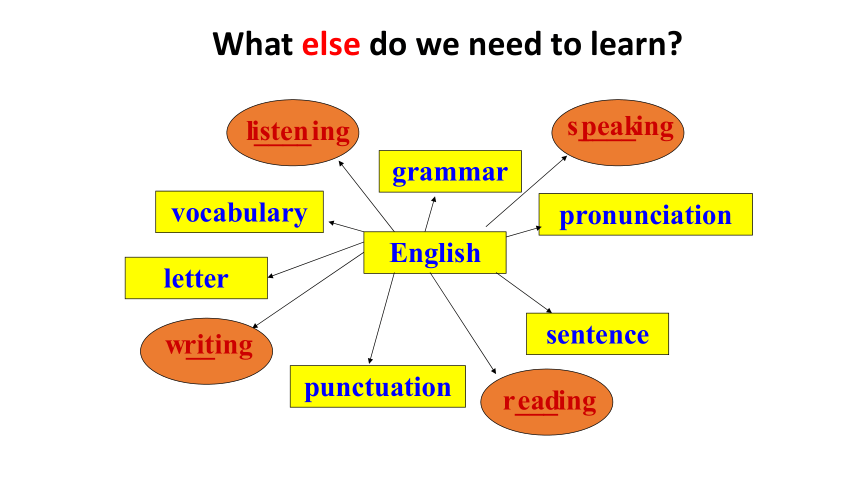

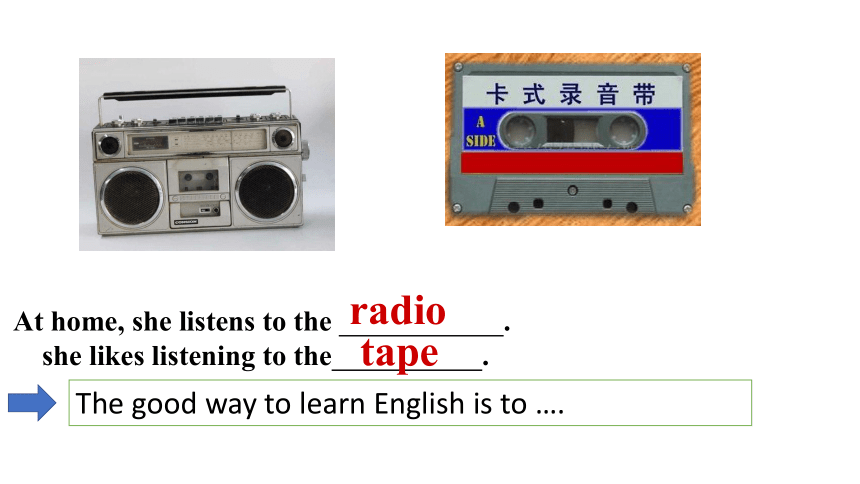
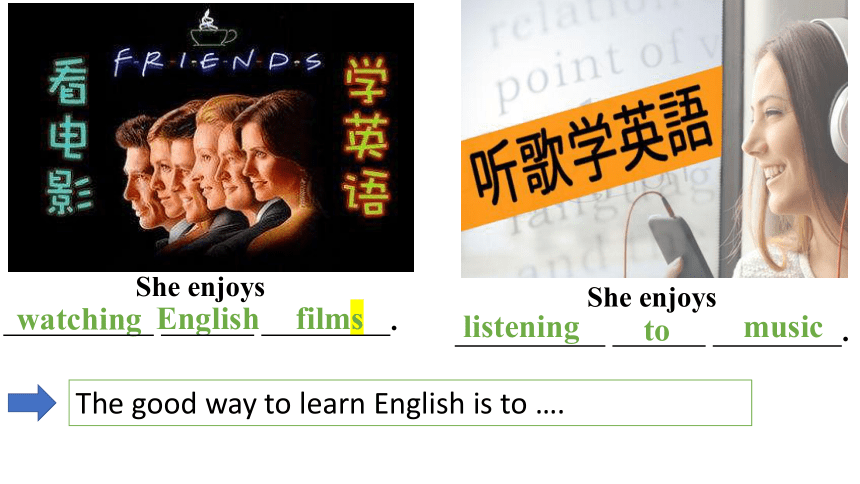

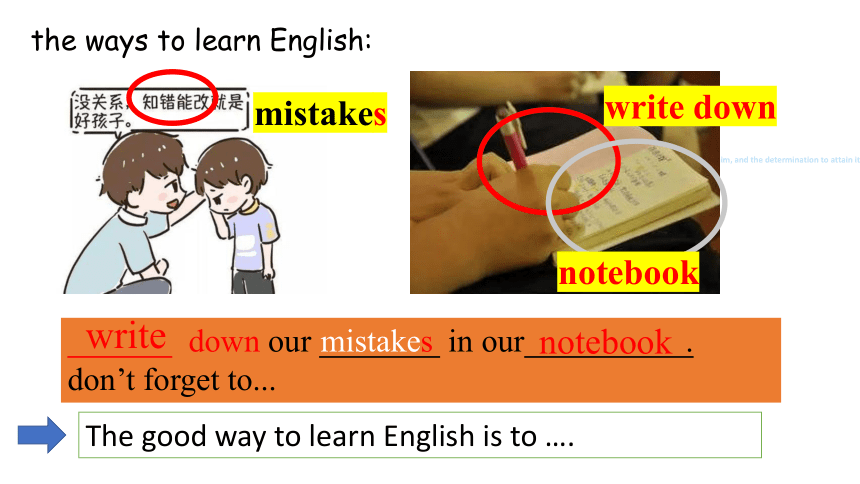
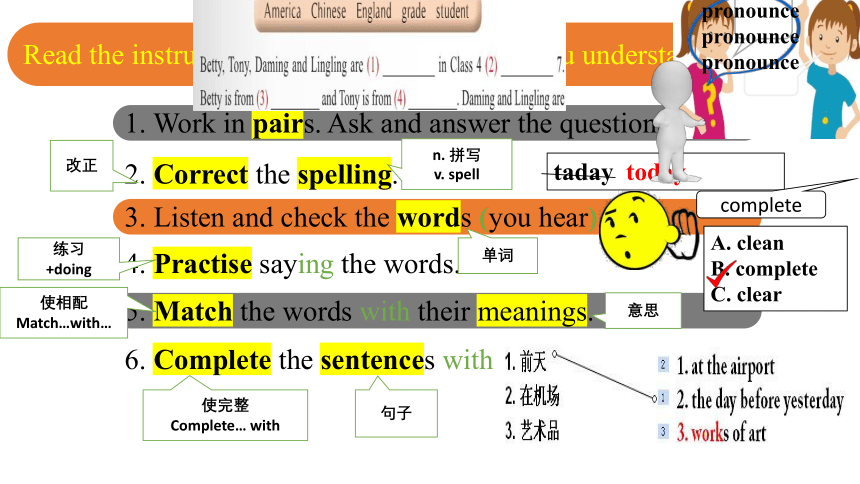
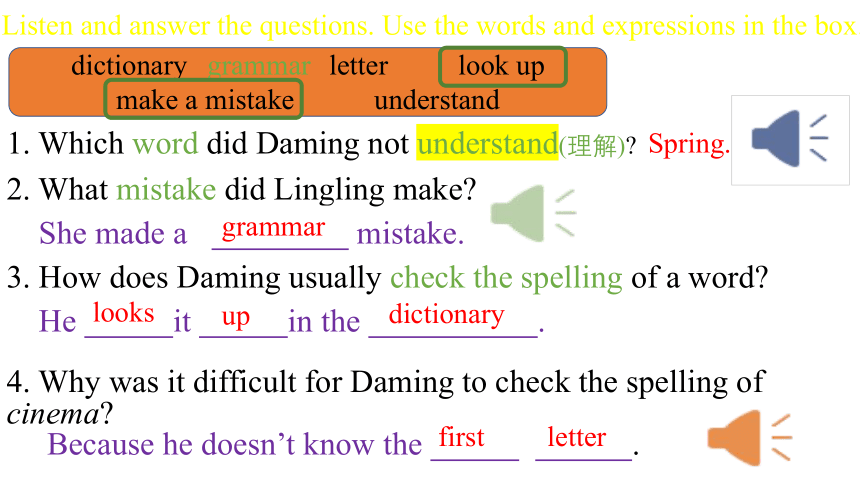
文档简介
(共38张PPT)
module 1 unit1
Let's try to speak English
as much as possible
----listening and speaking
Do you know these countries
What language do people speak in these countries
England
America
Australia
Africa
English
American
Australian
African
●English is widely used in many countries of the world.
Which language is the most(最) widely(广泛地) used(使用)
●English is very important.
4
newspaper
magazine
Where can we see English in our daily(日常的) life
movie
TV
dictionary
English
sentence
vocabulary
pronunciation
letter
grammar
punctuation
s____ing
l____ing
r___ing
w__ing
isten
ead
peak
rit
What else do we need to learn
How to learn English well
Amy is good at English.
She is going to talk about good ways to learn English.
擅长
谈论
学习英语的好方式
At home, she listens to the .
she likes listening to the .
radio
tape
The good way to learn English is to ….
She enjoys
.
watching
English
films
She enjoys
.
listening
to
music
The good way to learn English is to ….
watch English films
listen to English songs
the ways to learn English:
talk with foreigners
The important thing in life is to have a great aim, and the determination to attain it
look up in the dictionary
与…聊天
查字典
The good way to learn English is to ….
the ways to learn English:
down our in our .
don’t forget to...
The important thing in life is to have a great aim, and the determination to attain it
mistakes
write down
notebook
write
mistakes
notebook
The good way to learn English is to ….
4. Practise saying the words.
3. Listen and check the words (you hear).
6. Complete the sentences with the words in the box.
5. Match the words with their meanings.
Read the instructions and check(√) the ones you understand.
2. Correct the spelling.
1. Work in pairs. Ask and answer the questions.
一队;2个人
改正
n. 拼写
v. spell
单词
练习
+doing
使相配
Match…with…
意思
使完整
Complete… with
句子
taday today
complete
A. clean
B. complete
C. clear
pronounce
pronounce
pronounce
Listen and answer the questions. Use the words and expressions in the box.
dictionary grammar letter look up
make a mistake understand
1. Which word did Daming not understand(理解)
2. What mistake did Lingling make
She made a mistake.
3. How does Daming usually check the spelling of a word
He it in the .
4. Why was it difficult for Daming to check the spelling of cinema
Because he doesn’t know the .
Spring.
grammar
looks
first
up
dictionary
letter
Listening:
You should listen to …
Speaking:
You should always …
Reading:
You should ….
Writing:
….
Good ways to learn English:
Who has some advice
意见(不可数)
What do we need to learn
tape/radio/
English songs
speak English
as much as possible
pronounce?
Pronunciation?
1. What’s the dialogue talking about
A. Listening. B. Speaking.
C. Reading and writing. D. Good ways to learn English.
2. How do you know (fill in the blanks)
3. How many advice is mentioned(提及)
Today, we’re going to good ways to . Who has some advice
talk about
learn English
Ms James: Welcome back, everyone! Today, we’re going to talk about good ways to learn English. Ready Who has some advice
Lingling: We should always English in class.
Ms James: Good! Let’s to speak English as much as .
Daming: Why not our mistakes in our notebooks
Ms James: That’s a good idea. And don’t forget to write down the answers next to the mistakes. What else
Lingling: It’s a good idea to and new words every day.
Ms James: Thanks a lot, Lingling. How about the radio
Daming: Yes, that’s good for our too. But there are so many new words.
Ms James: You don’t need to every word.
You just need to for words and ideas.
Daming: That’s the same for reading. English are so . I get to know a lot about the world through reading.
Lingling: I think writing is also . Why don’t we try to some English pen We can them.
Ms James: Excellent! I agree with you.
speak
try
possible
write
down
correct
spell
pronounce
aloud
listening
to
pronunciation
understand
listen
key
main
stories
interesting
important
find
friends
write
to
Ms James: Welcome back, everyone! Today, we’re going to talk about good ways to learn English. Ready Who has some advice
Lingling: We should always speak English in class.
Ms James: Good! Let’s try to speak English as much as possible.
Daming: Why not write down our mistakes in our notebooks
Ms James: That’s a good idea. And don’t forget to write down the correct answers next to the mistakes. What else
Lingling: It’s a good idea to spell and pronounce new words aloud every day.
Ms James: Thanks a lot, Lingling. How about listening to the radio
Daming: Yes, that’s good for our pronunciation too. But there are so many new words.
Ms James: You don’t need to understand every word. You just need to listen for key words and main ideas.
Daming: That’s the same for reading. English stories are so interesting. I get to know a lot about the world through reading.
Lingling: I think writing is also important. Why don’t we try to find some English pen friends We can write to them.
Ms James: Excellent! I agree with you.
How many advice is given
How do you think of this advice
We should always speak English in class.
Let’s try to speak English as much as possible.
Why not write down our mistakes in our notebooks
And don’t forget to write down the correct answers next to the mistakes.
It’s a good idea to spell and pronounce new words aloud every day.
How about listening to the radio
You just need to listen for key words and main ideas.
English stories are so interesting. I get to know a lot about the world through reading.
Why don’t we try to find some English pen friends We can write to them.
Advice
We should do …我们应该…
Let’s do… as much as possible. 让我们尽可能地去做…
Why not do… 为什么不做…?
Don’t forget to do…不要忘记去做…
It’s a good idea to do…做…是一个好主意
How about doing… 要不做…
You just need to do …你只需要做…
Why don’t we do… 为什么我们不…
We can do… 我们能….
1. Which piece of advice do you think is useful And why
2. Which piece of advice do you think is not useful And why
3. Can you offer more general advice on learning English
How do they give advice
We/You should…
Let’s try to …
Why not… /Why don’t you...
Don’t forget to…/Remeber to...
It’s a good idea to …
How/What about …
You (don’t) need to …
Read and think P2
I advise you to....
I suggest you (do)....
You are supposed to...
You ought to...
Helen’s problem
Helen has problems in ___________.
speaking
Do you have any advice for her
What is Helen’s problem
Complete the advice P7
Hello, Helen,
You need to practise speaking more often. _________ you look for some English-speaking people in your hometown _________ saying hello to them and asking them where they come from ______ make friends with them and take them around your town.
Is there an English club in your town If there is not, _______ start one with your friends _________ playing a few games and listening to some music You can watch English films together, and ______ speak English all the time. You _______ invite your new English-speaking friends to your club!
Best,
Diana
Why don’t
How about
Try to
Why not
How about
try to
should
Pair work
Step 1: Think about your problem in learning English.
I have problems in speaking.
It is difficult for me to spell words.
I don’t know how to write correct sentences.
I often make mistakes in grammar.
…
Grammar
Vocabulary
Listening
Speaking
Reading
Writing
Pronunciation
Step 2: Give advice to each other according to his or her problem.
Try to .../ We should.../ Let’s.../ Why not... / Don’t forget to.../ It’s a good idea to.../ Why don’t you... / You can...
A: I have problems in…
B: It’s a good idea to…
Step 3: make a conversation.
Talk about at least 1 of my problems in English learning ☆
Give 2 pieces of advice to each problem ☆
Use different ways to give advice ☆
Here is my (1) advice/ notebook on learning English. Speak English (2) always/ as much as possible in class, and listen to English (3) in the newspaper/ on the radio. I (4) agree/ forget it is a good idea to look up new words in the (5) notebook/ dictionary. You can find the (6) correct/ excellent pronunciation and learn the meaning.
4 Underline the correct words and expressions.
【知识点1】advice 的用法
Who has some advice 谁有一些建议呢?(P2)
1. 你的建议对我大有帮助。
Your (advise) is great.
2. 点餐时可以大胆征求意见。
Don’t be afraid to ask for (advice) about ordering the meal.
3. 听我的,离他远一点
Take my (advice) and stay away from him!
即学即练
—Miss Li, could you give me ______ on English learning
—Certainly. First you should speak English every day.
A. any advices B. many advices
C. some advice D. some advices
C
advice
advice
advice
【知识点2】
write down的用法
Why not write down our mistakes in our notebooks
为什么不把错误记在我们的笔记本上呢?(P2)
write down 意为“写下;记下”。
write down的宾语若是名词,放在down前后均可;若是代词,必须放在down之前。
请把这些生词记在你的笔记本上。
Please these new words in your notebook.
= Please these new words in your notebook.
(these new words为名词词组)
write
down
write
down
1. If you ________ your name on the paper, you can get a magazine.
A. cut down B. look down C. turn down D. write down
2. I’ll give you some advice. Please ________.
A. write down them B. write them down C. write down it D. write it down
D
D
【知识点3】
forget的用法
And don’t forget to write down the correct answers next to the mistakes. 而且不要忘记在错误旁边写上正确的答案。(P2)
1.对不起,我忘记归还图书馆的书了。
I’m sorry I forgot (return) the library book.
2.他忘记了五岁时曾跟父母去过上海。
He forgot (go) to Shanghai with his parents when he was five years old.
3.我把她的名字给忘了。
I (forget) her name.
to return
(书没有归还)
going
(去过上海)
forgot
1. Don’t forget _____ thanks when other people help you.
A. said B. saying C. say D. to say
2. ---- Remember _____ to my daughter’s dance show next Sunday.
---- Of course I will. I’ll never forget _____ her dance for the first time last year.
A. to come; to see B. coming; to see C. to come; seeing D. coming; seeing
D
C
【知识点4】
agree with的用法
I agree with you. 我赞同你的看法。(P2)
agree是动词,为“同意;赞成;答应”
agree with sb. 意为“同意某人的意见”
【拓展】
agree on ... 意为“就……取得一致意见”。
agree to do sth. 意为“同意 / 答应做某事”。
agree to sth. 后接表示计划、条件、建议等名词或代词,为“同意某事”。
1.我同意你所说的。
I agree what you said.
(1) I don’t ______ __ this plan.
(2) I quite __________ what he said.
(3) She __________________ help me.
2. - I think listening more is good ______ your English study.- Yes, I agree you.
A. at; for B. with; to C. for; with D. at; with
agree to
agree with
agreed to / agrees to
C
【知识点5】else与other的区别
What else 还有其他的什么吗?(P2)
1. ---- Is that all Do you want ______
---- No, thanks. That’s enough.
something else
anything else
C. other thing
D. the others
2. Lucy and some ______ girls went shopping yesterday afternoon.
other B. another
C. the other D. else
B
A
在画上你还能看见别的什么吗?
What can you see in the picture
你还能看到别的东西吗?
What things can you see
else
other
【知识点6】 aloud, loud与loudly的区别
It’s a good idea to spell and pronounce new words aloud every day.
每天大声拼读生词是一个好主意。(P2)
1. I can’t hear you clearly. Could you please read the news _____
A. differently B. quickly C. carefully D. aloud
2.这音乐声音太大了。请把音量调小一些。
The music is too . Please turn it down.
3.他们大声地为自己的足球队喝彩
They cheered for their football team.
D
loud
loudly
【知识点7】
“Why not ...?”
Why not write down our mistakes in our notebooks 为什么不把错误记在我们的笔记本上呢?(P2)
“Why not ... ”=“Why don’t you ... ”,意为“为什么不……?”,用于提出某种建议,后接动词原形。
【拓展】
表示“建议”的常用句型:
Why not do / Why don’t you do ... 为什么不做……
Let’s do ...! 让我们做……吧!
Shall we do ... 我们做……好吗
You’d better do ... 你最好做……
Would you mind (not) doing ... 你介意(不)做……吗
你为什么不早点去学校呢?
to school early
= you to school early
Why
not
go
Why
don’t
go
1. Why not _______ him a car --Good idea
A. buy B. buying C. to buy D. buys
2. It’s a good idea, why _____
A. do you write it down B. you write it down
C. not you write it down D. don’t you write it down
A
D
英语有两种基本语调:升调和降调。1.升调(↗)多用来表示 “不肯定” 和 “未完结”, 在一般疑问句、委婉的祈使句和打招呼的用语中。
Pronunciation and speaking
陈述句:I am happy.
特殊问句:How are you // Where are you // When will you come
祈使句:Come in!
感叹句:What a hot day!
2.降调(↙)表示“肯定”和“完结”,一般出现在陈述句、祈使句和特殊疑问句中。感叹句中多用降调表示感叹。
Are you happy
Do you finish your homework
Listen and try to mark the intonation.
1. We should always speak English in class.
2. Let’s try to speak English as much as possible.
3. Why not write down our mistakes in our notebooks
4. It’s a good idea to spell and pronounce new words aloud.
5. How about listening to the radio
1.升调(↗)多用来表示 “不肯定” 和 “未完结”, 在一般疑问句、委婉的祈使句和打招呼的用语中。
2.降调(↙)表示“肯定”和“完结”,一般出现在陈述句、祈使句和特殊疑问句中。感叹句中多用降调表示感叹。
基础过关训练
一、用括号内所给单词的适当形式填空。
1. He is going to (watch) TV this Sunday.
2. Why don’t you (go) to movies
3. We should (study) hard.
4. It’s a good idea (read) English in the morning.
5. How about (play) football this afternoon
6. ---- What are they doing
---- They (listen) to music.
7. Can you (help) me with my English
8. Hw often write the correct (spell) next to the
mistakes.
watch
go
study
to read
playing
are listening
help
spelling
1. How about ______ out for a walk
A. go B. going C. to go D. goes
2. It’s a good idea ______ English by watching English films.
A. learn B. to learn C. learning D. learned
3. The problem are difficult to solve. Please give me ______.
A. some advices B. an advice C. advices D. some advice
4. ---- Let’s buy an MP3 and listen to English songs.
---- I agree _____ you.
A. on B. with C. in D. at
5. Don’t worry. I can help you ______ your English.
A. for B. on C. in D. with
6. ---- I have a cold. ---- Maybe you _____ see a doctor.
A. need B. needn’t C. should D. shouldn’t
二、单项选择。
B
B
D
B
D
C
5. ---- Why not ______ John a toy car for his birthday
---- Good idea! He is crazy about cars.
A. buy B. buying C. to buy D. buys
6. Oh, listen! It’s raining outside. We’d better ______.
A. to keep the door closed B. not close the door
C. to close the door D. keep the door closed
9. What are you going to _______ this evening.
A. do B. does C. doing D. to do
10. David likes music and he _______ music every day.
A. listens B. listens to C. sounds D. hears
11. It will rain soon. Don’t forget _______ an umbrella.
A. take B. bring C. to bring D. to take
12. ---- Don’t forget the new words and expressions in
this lesson.
---- Yes, and I will ________ in my notebook.
A. write them down B. write it down
C. write down them D. write down it
A
D
A
B
D
A
1. 你应该在字典里查一下这些生词。
You ______ _____ ___ the new words in the dictionary.
2. 你为什么不加入音乐俱乐部呢?
_____ _____ you _____ the music club
3. 吃蔬菜对你的健康有好处。
Eating vegetables ___ _____ ____ your health.
4. 在课堂上不要大声说话。
Don’t talk loudly ___ ______.
5. 今天下午去购物怎么样?
______ ______ ______shopping this afternoon
6. 看电影和听歌曲是学习英语的好方法。
_________ films and ________ ___ songs are good ways to learn English.
三、根据汉语提示完成句子(每空一词)。
should look up
Why don’t join
is good for
in class
What about going
Watching
listening to
1. 查,查找 ________
2. 犯错误 _______________
3. 谈论 ____________
4. 努力试图做某事 ______________
5. 写下,记下 _____________
6. 尽可能多地 ______________________
7. 忘记去做某事 _________________
8. 需要做某事 ________________
9. 同意某人 _______________
look up
make a mistake
talk about
try to do sth.
write down
as much as possible
forget to do sth.
need to do sth.
agree with sb.
四、翻译下列短语。
module 1 unit1
Let's try to speak English
as much as possible
----listening and speaking
Do you know these countries
What language do people speak in these countries
England
America
Australia
Africa
English
American
Australian
African
●English is widely used in many countries of the world.
Which language is the most(最) widely(广泛地) used(使用)
●English is very important.
4
newspaper
magazine
Where can we see English in our daily(日常的) life
movie
TV
dictionary
English
sentence
vocabulary
pronunciation
letter
grammar
punctuation
s____ing
l____ing
r___ing
w__ing
isten
ead
peak
rit
What else do we need to learn
How to learn English well
Amy is good at English.
She is going to talk about good ways to learn English.
擅长
谈论
学习英语的好方式
At home, she listens to the .
she likes listening to the .
radio
tape
The good way to learn English is to ….
She enjoys
.
watching
English
films
She enjoys
.
listening
to
music
The good way to learn English is to ….
watch English films
listen to English songs
the ways to learn English:
talk with foreigners
The important thing in life is to have a great aim, and the determination to attain it
look up in the dictionary
与…聊天
查字典
The good way to learn English is to ….
the ways to learn English:
down our in our .
don’t forget to...
The important thing in life is to have a great aim, and the determination to attain it
mistakes
write down
notebook
write
mistakes
notebook
The good way to learn English is to ….
4. Practise saying the words.
3. Listen and check the words (you hear).
6. Complete the sentences with the words in the box.
5. Match the words with their meanings.
Read the instructions and check(√) the ones you understand.
2. Correct the spelling.
1. Work in pairs. Ask and answer the questions.
一队;2个人
改正
n. 拼写
v. spell
单词
练习
+doing
使相配
Match…with…
意思
使完整
Complete… with
句子
taday today
complete
A. clean
B. complete
C. clear
pronounce
pronounce
pronounce
Listen and answer the questions. Use the words and expressions in the box.
dictionary grammar letter look up
make a mistake understand
1. Which word did Daming not understand(理解)
2. What mistake did Lingling make
She made a mistake.
3. How does Daming usually check the spelling of a word
He it in the .
4. Why was it difficult for Daming to check the spelling of cinema
Because he doesn’t know the .
Spring.
grammar
looks
first
up
dictionary
letter
Listening:
You should listen to …
Speaking:
You should always …
Reading:
You should ….
Writing:
….
Good ways to learn English:
Who has some advice
意见(不可数)
What do we need to learn
tape/radio/
English songs
speak English
as much as possible
pronounce?
Pronunciation?
1. What’s the dialogue talking about
A. Listening. B. Speaking.
C. Reading and writing. D. Good ways to learn English.
2. How do you know (fill in the blanks)
3. How many advice is mentioned(提及)
Today, we’re going to good ways to . Who has some advice
talk about
learn English
Ms James: Welcome back, everyone! Today, we’re going to talk about good ways to learn English. Ready Who has some advice
Lingling: We should always English in class.
Ms James: Good! Let’s to speak English as much as .
Daming: Why not our mistakes in our notebooks
Ms James: That’s a good idea. And don’t forget to write down the answers next to the mistakes. What else
Lingling: It’s a good idea to and new words every day.
Ms James: Thanks a lot, Lingling. How about the radio
Daming: Yes, that’s good for our too. But there are so many new words.
Ms James: You don’t need to every word.
You just need to for words and ideas.
Daming: That’s the same for reading. English are so . I get to know a lot about the world through reading.
Lingling: I think writing is also . Why don’t we try to some English pen We can them.
Ms James: Excellent! I agree with you.
speak
try
possible
write
down
correct
spell
pronounce
aloud
listening
to
pronunciation
understand
listen
key
main
stories
interesting
important
find
friends
write
to
Ms James: Welcome back, everyone! Today, we’re going to talk about good ways to learn English. Ready Who has some advice
Lingling: We should always speak English in class.
Ms James: Good! Let’s try to speak English as much as possible.
Daming: Why not write down our mistakes in our notebooks
Ms James: That’s a good idea. And don’t forget to write down the correct answers next to the mistakes. What else
Lingling: It’s a good idea to spell and pronounce new words aloud every day.
Ms James: Thanks a lot, Lingling. How about listening to the radio
Daming: Yes, that’s good for our pronunciation too. But there are so many new words.
Ms James: You don’t need to understand every word. You just need to listen for key words and main ideas.
Daming: That’s the same for reading. English stories are so interesting. I get to know a lot about the world through reading.
Lingling: I think writing is also important. Why don’t we try to find some English pen friends We can write to them.
Ms James: Excellent! I agree with you.
How many advice is given
How do you think of this advice
We should always speak English in class.
Let’s try to speak English as much as possible.
Why not write down our mistakes in our notebooks
And don’t forget to write down the correct answers next to the mistakes.
It’s a good idea to spell and pronounce new words aloud every day.
How about listening to the radio
You just need to listen for key words and main ideas.
English stories are so interesting. I get to know a lot about the world through reading.
Why don’t we try to find some English pen friends We can write to them.
Advice
We should do …我们应该…
Let’s do… as much as possible. 让我们尽可能地去做…
Why not do… 为什么不做…?
Don’t forget to do…不要忘记去做…
It’s a good idea to do…做…是一个好主意
How about doing… 要不做…
You just need to do …你只需要做…
Why don’t we do… 为什么我们不…
We can do… 我们能….
1. Which piece of advice do you think is useful And why
2. Which piece of advice do you think is not useful And why
3. Can you offer more general advice on learning English
How do they give advice
We/You should…
Let’s try to …
Why not… /Why don’t you...
Don’t forget to…/Remeber to...
It’s a good idea to …
How/What about …
You (don’t) need to …
Read and think P2
I advise you to....
I suggest you (do)....
You are supposed to...
You ought to...
Helen’s problem
Helen has problems in ___________.
speaking
Do you have any advice for her
What is Helen’s problem
Complete the advice P7
Hello, Helen,
You need to practise speaking more often. _________ you look for some English-speaking people in your hometown _________ saying hello to them and asking them where they come from ______ make friends with them and take them around your town.
Is there an English club in your town If there is not, _______ start one with your friends _________ playing a few games and listening to some music You can watch English films together, and ______ speak English all the time. You _______ invite your new English-speaking friends to your club!
Best,
Diana
Why don’t
How about
Try to
Why not
How about
try to
should
Pair work
Step 1: Think about your problem in learning English.
I have problems in speaking.
It is difficult for me to spell words.
I don’t know how to write correct sentences.
I often make mistakes in grammar.
…
Grammar
Vocabulary
Listening
Speaking
Reading
Writing
Pronunciation
Step 2: Give advice to each other according to his or her problem.
Try to .../ We should.../ Let’s.../ Why not... / Don’t forget to.../ It’s a good idea to.../ Why don’t you... / You can...
A: I have problems in…
B: It’s a good idea to…
Step 3: make a conversation.
Talk about at least 1 of my problems in English learning ☆
Give 2 pieces of advice to each problem ☆
Use different ways to give advice ☆
Here is my (1) advice/ notebook on learning English. Speak English (2) always/ as much as possible in class, and listen to English (3) in the newspaper/ on the radio. I (4) agree/ forget it is a good idea to look up new words in the (5) notebook/ dictionary. You can find the (6) correct/ excellent pronunciation and learn the meaning.
4 Underline the correct words and expressions.
【知识点1】advice 的用法
Who has some advice 谁有一些建议呢?(P2)
1. 你的建议对我大有帮助。
Your (advise) is great.
2. 点餐时可以大胆征求意见。
Don’t be afraid to ask for (advice) about ordering the meal.
3. 听我的,离他远一点
Take my (advice) and stay away from him!
即学即练
—Miss Li, could you give me ______ on English learning
—Certainly. First you should speak English every day.
A. any advices B. many advices
C. some advice D. some advices
C
advice
advice
advice
【知识点2】
write down的用法
Why not write down our mistakes in our notebooks
为什么不把错误记在我们的笔记本上呢?(P2)
write down 意为“写下;记下”。
write down的宾语若是名词,放在down前后均可;若是代词,必须放在down之前。
请把这些生词记在你的笔记本上。
Please these new words in your notebook.
= Please these new words in your notebook.
(these new words为名词词组)
write
down
write
down
1. If you ________ your name on the paper, you can get a magazine.
A. cut down B. look down C. turn down D. write down
2. I’ll give you some advice. Please ________.
A. write down them B. write them down C. write down it D. write it down
D
D
【知识点3】
forget的用法
And don’t forget to write down the correct answers next to the mistakes. 而且不要忘记在错误旁边写上正确的答案。(P2)
1.对不起,我忘记归还图书馆的书了。
I’m sorry I forgot (return) the library book.
2.他忘记了五岁时曾跟父母去过上海。
He forgot (go) to Shanghai with his parents when he was five years old.
3.我把她的名字给忘了。
I (forget) her name.
to return
(书没有归还)
going
(去过上海)
forgot
1. Don’t forget _____ thanks when other people help you.
A. said B. saying C. say D. to say
2. ---- Remember _____ to my daughter’s dance show next Sunday.
---- Of course I will. I’ll never forget _____ her dance for the first time last year.
A. to come; to see B. coming; to see C. to come; seeing D. coming; seeing
D
C
【知识点4】
agree with的用法
I agree with you. 我赞同你的看法。(P2)
agree是动词,为“同意;赞成;答应”
agree with sb. 意为“同意某人的意见”
【拓展】
agree on ... 意为“就……取得一致意见”。
agree to do sth. 意为“同意 / 答应做某事”。
agree to sth. 后接表示计划、条件、建议等名词或代词,为“同意某事”。
1.我同意你所说的。
I agree what you said.
(1) I don’t ______ __ this plan.
(2) I quite __________ what he said.
(3) She __________________ help me.
2. - I think listening more is good ______ your English study.- Yes, I agree you.
A. at; for B. with; to C. for; with D. at; with
agree to
agree with
agreed to / agrees to
C
【知识点5】else与other的区别
What else 还有其他的什么吗?(P2)
1. ---- Is that all Do you want ______
---- No, thanks. That’s enough.
something else
anything else
C. other thing
D. the others
2. Lucy and some ______ girls went shopping yesterday afternoon.
other B. another
C. the other D. else
B
A
在画上你还能看见别的什么吗?
What can you see in the picture
你还能看到别的东西吗?
What things can you see
else
other
【知识点6】 aloud, loud与loudly的区别
It’s a good idea to spell and pronounce new words aloud every day.
每天大声拼读生词是一个好主意。(P2)
1. I can’t hear you clearly. Could you please read the news _____
A. differently B. quickly C. carefully D. aloud
2.这音乐声音太大了。请把音量调小一些。
The music is too . Please turn it down.
3.他们大声地为自己的足球队喝彩
They cheered for their football team.
D
loud
loudly
【知识点7】
“Why not ...?”
Why not write down our mistakes in our notebooks 为什么不把错误记在我们的笔记本上呢?(P2)
“Why not ... ”=“Why don’t you ... ”,意为“为什么不……?”,用于提出某种建议,后接动词原形。
【拓展】
表示“建议”的常用句型:
Why not do / Why don’t you do ... 为什么不做……
Let’s do ...! 让我们做……吧!
Shall we do ... 我们做……好吗
You’d better do ... 你最好做……
Would you mind (not) doing ... 你介意(不)做……吗
你为什么不早点去学校呢?
to school early
= you to school early
Why
not
go
Why
don’t
go
1. Why not _______ him a car --Good idea
A. buy B. buying C. to buy D. buys
2. It’s a good idea, why _____
A. do you write it down B. you write it down
C. not you write it down D. don’t you write it down
A
D
英语有两种基本语调:升调和降调。1.升调(↗)多用来表示 “不肯定” 和 “未完结”, 在一般疑问句、委婉的祈使句和打招呼的用语中。
Pronunciation and speaking
陈述句:I am happy.
特殊问句:How are you // Where are you // When will you come
祈使句:Come in!
感叹句:What a hot day!
2.降调(↙)表示“肯定”和“完结”,一般出现在陈述句、祈使句和特殊疑问句中。感叹句中多用降调表示感叹。
Are you happy
Do you finish your homework
Listen and try to mark the intonation.
1. We should always speak English in class.
2. Let’s try to speak English as much as possible.
3. Why not write down our mistakes in our notebooks
4. It’s a good idea to spell and pronounce new words aloud.
5. How about listening to the radio
1.升调(↗)多用来表示 “不肯定” 和 “未完结”, 在一般疑问句、委婉的祈使句和打招呼的用语中。
2.降调(↙)表示“肯定”和“完结”,一般出现在陈述句、祈使句和特殊疑问句中。感叹句中多用降调表示感叹。
基础过关训练
一、用括号内所给单词的适当形式填空。
1. He is going to (watch) TV this Sunday.
2. Why don’t you (go) to movies
3. We should (study) hard.
4. It’s a good idea (read) English in the morning.
5. How about (play) football this afternoon
6. ---- What are they doing
---- They (listen) to music.
7. Can you (help) me with my English
8. Hw often write the correct (spell) next to the
mistakes.
watch
go
study
to read
playing
are listening
help
spelling
1. How about ______ out for a walk
A. go B. going C. to go D. goes
2. It’s a good idea ______ English by watching English films.
A. learn B. to learn C. learning D. learned
3. The problem are difficult to solve. Please give me ______.
A. some advices B. an advice C. advices D. some advice
4. ---- Let’s buy an MP3 and listen to English songs.
---- I agree _____ you.
A. on B. with C. in D. at
5. Don’t worry. I can help you ______ your English.
A. for B. on C. in D. with
6. ---- I have a cold. ---- Maybe you _____ see a doctor.
A. need B. needn’t C. should D. shouldn’t
二、单项选择。
B
B
D
B
D
C
5. ---- Why not ______ John a toy car for his birthday
---- Good idea! He is crazy about cars.
A. buy B. buying C. to buy D. buys
6. Oh, listen! It’s raining outside. We’d better ______.
A. to keep the door closed B. not close the door
C. to close the door D. keep the door closed
9. What are you going to _______ this evening.
A. do B. does C. doing D. to do
10. David likes music and he _______ music every day.
A. listens B. listens to C. sounds D. hears
11. It will rain soon. Don’t forget _______ an umbrella.
A. take B. bring C. to bring D. to take
12. ---- Don’t forget the new words and expressions in
this lesson.
---- Yes, and I will ________ in my notebook.
A. write them down B. write it down
C. write down them D. write down it
A
D
A
B
D
A
1. 你应该在字典里查一下这些生词。
You ______ _____ ___ the new words in the dictionary.
2. 你为什么不加入音乐俱乐部呢?
_____ _____ you _____ the music club
3. 吃蔬菜对你的健康有好处。
Eating vegetables ___ _____ ____ your health.
4. 在课堂上不要大声说话。
Don’t talk loudly ___ ______.
5. 今天下午去购物怎么样?
______ ______ ______shopping this afternoon
6. 看电影和听歌曲是学习英语的好方法。
_________ films and ________ ___ songs are good ways to learn English.
三、根据汉语提示完成句子(每空一词)。
should look up
Why don’t join
is good for
in class
What about going
Watching
listening to
1. 查,查找 ________
2. 犯错误 _______________
3. 谈论 ____________
4. 努力试图做某事 ______________
5. 写下,记下 _____________
6. 尽可能多地 ______________________
7. 忘记去做某事 _________________
8. 需要做某事 ________________
9. 同意某人 _______________
look up
make a mistake
talk about
try to do sth.
write down
as much as possible
forget to do sth.
need to do sth.
agree with sb.
四、翻译下列短语。
同课章节目录
- Module 1 How to learn English
- Unit 1 Let's try to speak English as much as possi
- Unit 2 You should smile at her.
- Unit 3 Language in use .
- Module 2 My home town and my country
- Unit 1 It's taller than many other buildings.
- Unit 2 Cambridge is a beautiful city in the east o
- Unit 3 Language in use .
- Module 3 Sports.
- Unit 1 Nothing is more exciting than playing tenni
- Unit 2 This year we training more carefully.
- Unit 3 Language in use .
- Module 4 Planes, ships and trains .
- Unit 1 He lives the farthest from school.
- Unit 2 What is the best way to travel.
- Unit 3 Language in use .
- Module 5 Lao She Teahouse.
- Unit 1 I wanted to see the Beijing Opera.
- Unit 2 It descibes the changes in Chinese society.
- Unit 3 Language in use .
- Module 6 Animals in danger.
- Unit 1 It allows people to get closer to them .
- Unit 2 The WWF is working hard to save them all.
- Unit 3 Language in use .
- Revision module A
- Module 7 A famous story
- Unit 1 Alice was sitting with her sister by the ri
- Unit 2 She was thinking about her cat.
- Unit 3 Language in use .
- Module 8 Accidents
- Unit 1 While the car were changing to red, a car s
- Unit 2 I was trying to pick it up when it bite me
- Unit 3 Language in use .
- Module 9 Population
- Unit 1 The population of China is about 1.37 billi
- Unit 2 Arnwick was a city with 200,000 people.
- Unit 3 Language in use .
- Module 10 The weathe
- Unit 1 It might snow.
- Unit 2 The weather is fine all year round.
- Unit 3 Language in use .
- Module 11 Way of life
- Unit 1 In China ,we open a gift later.
- Unit 2 In England, you usually drink tea with milk
- Unit 3 Language in use .
- Module 12 Help
- Unit 1 What should we do before help arrives?
- Unit 2 Stay away from windows and heavy furniture.
- Unit 3 Language in use .
- Revision module B
